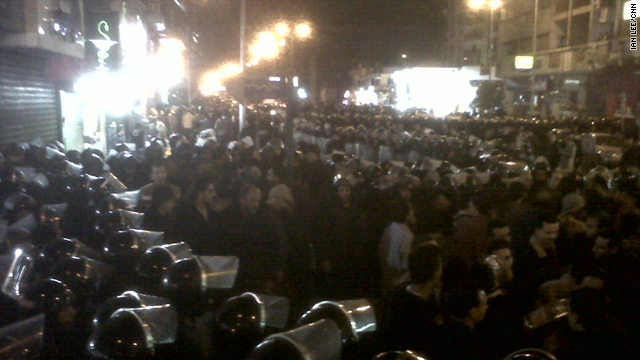Egypt Snapshot: "Tunisia and Algeria Riots Won't Happen Here" (Sarant)
 Louise Sarant of Al Masry Al Youm offers reassurance:
Louise Sarant of Al Masry Al Youm offers reassurance:
Riots seen recently in Algeria and Tunisia are unlikely to spread to Egypt despite deteriorating economic conditions, experts say.
Although Tunisia, Algeria and Egypt are countries which, to a certain extent, are facing similar challenges --- bleak job prospects, unemployment, skyrocketing staple prices and the looming crisis of aging leaders--Egypt’s peculiar political context could render it immune to North Africa’s social upheaval.
“The people of Tunisia, Algeria and Egypt have adopted different ways to contest the socio-economic and political problems that plague their country,” said Amr Choubaki, researcher at the Al-Ahram Center for Political and Strategic Studies. Algeria’s wave of protests was triggered a week ago by the increased price of essential commodities such as cooking oil and sugar.
The Algerian state, in an attempt to clamp down on the country’s informal sector, has subjected resellers to a 17 percent VAT since 1 January, which has increased the price of basic goods. This led to an impossible situation for the Algerian people, whose basic salary is already inferior to that of its neighbors, despite the country's strong oil-based economy.
Tunisia has also been drawn into a spiral of violence over the past three weeks. The unrest originally started in the Tunisian central governorate of Sidi Bou Zid, when a young graduate set himself on fire after authorities seized the fruit and vegetables he was selling without a permit. The highly symbolic and desperate suicide attempt triggered an unprecedented wave of demonstrations and social unrest in the central governorates, regions that have not enjoyed Tunisian economic prosperity.
Unemployment rates are reaching 14 percent in Tunisia --- double that among young graduates, especially those who graduating from universities in remote governorates. Demonstrations have also been held in Tunis, supported by the main Tunisian workers’ syndicate UGTT (General Union of Tunisian Workers), despite President Zine al-Abidine Ben Ali’s 24 years of iron-fisted governance.
Ben Ali, who achieved a quite thriving economy enabling the growth of a strong middle-class, has deprived the same educated middle-class from accessing basic liberties.
“Tunisia is one of the most authoritarian countries in the region," said Choubaki, "and one that offers the most limited margins of expression... Social networks are scrutinized, web protesters and intellectuals are thrown in jail and there is no free and independent media.”
According to Choubaki, over the past few years Egypt has witnessed smaller demonstrations than those Tunisia is currently experiencing because Egypt has left open some channels of expression through the social networking site Facebook and through television shows. Activists can express their views through these media, which is why, Choubaki said, Egypt is not on the verge of a similar implosion.
Education also differentiates the two countries. “The youth in Tunisia benefit from education of a much better quality than the Egyptian youth, and this is also why they are provided with the means to fight repression and authoritarianism,” said Choubaki.
Amr Abdel Rahman, an Egyptian political analyst, said he believes there is no risk of spill-over from the Tunisian social movement into Egypt, because “in Tunisia, the revolt has been triggered by middle class, university-educated youth, while in Egypt demonstrations of that scale could only have the urban poor as a basis.”
Choubaki also notes that, “With the exception of the Mahalla textile workers’ demonstration in 2008, Egypt has not witnessed a single massive movement of protest but rather small and scattered gatherings to ask for salary raises or cheaper staples.”
From 2006 to 2008 there have been demonstrations in Egypt led by working class youth, yet, while educated youth supported the movements, they did not participate.
Another important factor that differentiates Egyptian from Tunisian movements is the role of the trade unions. In Tunisia, the major trade unions have managed to keep a margin of freedom from the state apparatus, while accepting some compromises, which has made it possible for the UGTT to call for strikes and support the ongoing demonstrations.
According to Abdel Rahman, “in Tunisia, the official trade union has gained a certain degree of independence, while in Egypt the official trade unions are completely submitted to the state and their main objective is to fragment the social movement instead of mobilizing them.”
Also referring to the Mahalla demonstration that happened in 2008, he stressed that “the Egyptian trade unions fragmented the movement on purpose.” Today, according to Choubaki, the unions have lost their credibility entirely. “Trade unions are dead in Egypt. An official body cannot represent the people and the workers,” he explained.
The massive bread riot of January 1977 could never happen in today’s Egypt, he added. “In the 60s and the 70s, Egypt had a healthy society with working institutions and trade unions that could mobilize the people, while today the religious discourse has infiltrated every pore of society and religious authorities; apolitical discourses have somehow played a role in calming people’s spirits in the country.”
 Al Masry Al Youm,
Al Masry Al Youm,  Algeria,
Algeria,  Amr Abdel Rahman,
Amr Abdel Rahman,  Amr Choubaki,
Amr Choubaki,  Egypt,
Egypt,  Tunisia
Tunisia 
Reader Comments